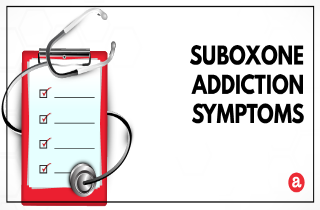While doctors agree that Suboxone addictive-ness is much less likely than stronger opioids, you can become addicted to Suboxone (especially if you snort Suboxone or take Suboxone to get high). So if you’re concerned that you or someone close to you is addicted to Suboxone…what do you do? In this article ,we will describe some of the signs and symptoms of Suboxone addiction, and educate you on the treatment of Suboxone addiction. Then, we invite your questions about Suboxone addiction at the end.
Symptoms of Suboxone addiction
Suboxone addiction includes both symptoms of abuse and symptoms of withdrawal. In fact, many symptoms are obvious and similar to those of other opiates and opioids, such as hydrocodone, oxycodone or codeine. Common Suboxone withdrawal symptoms include nausea and vomiting, along with diarrhea. Symptoms of Suboxone addiction or abuse to look for include:
- apathetic mood
- depression
- drowsiness
- increased blood pressure
- poor memory
- slurred speech
- small pupils
There are also some things to look for in regarding a potential addict’s psychological and lifestyle changes. According to the fourth edition of the Diagnostic and Statistical Manual of Mental Disorders (DSM-IV), the criteria for Suboxone abuse include:
- continued use of Suboxone despite having persistent or recurrent social or interpersonal problems due to Suboxone use
- failure to fulfill major role obligations at work, school or home
- frequent legal problems
- frequent use of Suboxone in situations which are physically hazardous, such as driving a car
If the person you are concerned about regularly has these problems, this may be a sign that they need to get help.
Suboxone addiction symptoms: Can they be treated?
Yes, Suboxone addiction symptoms can be treated. Any treatment for Suboxone addiction will combine psychotherapy, behavioral changes and pharmaceutical treatments. Addiction is a multifaceted disease that requires attention in all three areas. For long term sobriety, therapy and drastic behavior changes will be necessary.
1. How to intervene
Start by contacting an addiction therapist to learn the best ways to approach an addict. It is important to approach the situation in the correct way, so the Suboxone addict will want to seek help rather than remain in their addiction. Remember that you may not be dealing with the person that you know, because addiction can change them. In most cases, an intervention can be a good idea. Talk to an intervention specialist to set up a time when you can confront the addict in a manner where they will be receptive.
2. Detox and withdrawal
Physical Suboxone addiction symptoms are addressed drugin Suboxone detox. When withdrawing from Suboxone abuse, tapering and gradual dose reducation can help. Clonidine may help ease nausea. A detox clinic or addiction MD specialist can tell you more about pharmaceutical options during Suboxone detox.
3. Outpatient Suboxone addiction treatment
Treatment options for Suboxone addiction also address psychological Suboxone addiction symptoms. Treatment for Suboxone addiction includes both outpatient treatment and inpatient residential treatment, depending on the needs of the individual. Outpatient programs run addiction treatment programs via a facility where the patient will only be at the facility for scheduled appointments. They will go through an initial assessment and then will have group counseling session, individual counseling sessions as well as a physician to treat the withdrawal symptoms and to make sure their health is not declining.
4. Inpatient Suboxone addiction treatment
An outpatient program may be a good idea for someone who still has a job and a safe place to live. However, if the addict doesn’t have a job or a safe environment to live in, an inpatient program, where they would live onsite, would be a better choice. Inpatient programs are similar to outpatient programs, but the addict will be under constant supervision from nurses and health professionals in order to combat the physical symptoms, as well as beginning the long-term psychological treatment.
5. Support groups
Narcotics Anonymous is a non-profit, community-based organization for recovering addicts. Narcotics Anonymous members learn from one another how to live drug-free and recover from the affects of addiction. (na.org)
Signs of Suboxone addiction questions
Do you have more questions regarding the signs and symptoms of Suboxone addiction and treatment? Have advice or knowledge on the subject of Suboxone addiction? Send us your questions and we will respond quickly and personally.









Related Posts